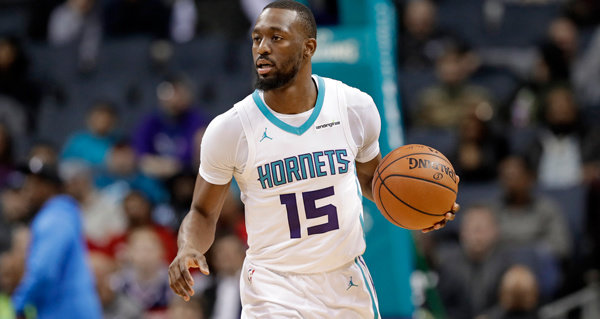I wonder how often Kemba Walker gets existential. Professional athletes tend to be intensely process-oriented people, and they don’t have much time for themselves. Jam-packed game days—tape study, shootaround, tub soak, shooting drill, paint drill, conferring with coaches, two and a half hours of turmoil, some interviews, and a ride home—give way to strenuous offseason regimens. It’s not as if there isn’t room for videogames, nights out, catching up with old friends, or an old-fashioned sit-and-think, but there isn’t an abundance of it, and you can only build your life around one thing when that thing is as difficult as playing in the NBA. Maybe you don’t ask a lot of questions about it, not because you’re incurious or unaware, but because you’re trying not to make it impossible. I mostly stopped pondering why I write years ago, and my job is so unserious that I can do work in a bar. Doubt—maybe this isn’t going well—is natural, but it’s not helpful. It’s something to overcome, and Kemba is good at overcoming.
He has a lot to be proud of. He came into the league having carried UConn to a national title. Like Dame Lillard and LeBron James, he’s an exceptional player who is also his team’s standard-setter in terms of work ethic. He’s developed from an undersized point guard with no jumper into a near-forty percent three-point shooter who finishes with surprising invention and assuredness around the rim. He’s been an All-Star for two years running. He’s rich as hell. Charlotte and the Bronx love him.
And yet, the currently cratering Hornets have to be stressing him out. Two seasons ago, the franchise appeared to be climbing into Eastern Conference’s middle tier, toward Washington Wizards-ly respectability, but they missed the playoffs by five games last year and this one is shaping up worse. Kemba’s doing fine. His scoring numbers are only a tick below what they were in 2016-17: 22.7 points per night with a 56.7 true shooting percentage. He’s having a bad March—4-for-14 against Phoenix last Saturday, 1-for-9 against Philly, 8-for-23 against Toronto—but his teammates aren’t picking him up. The five leading minutes-getters behind Kemba in the Charlotte rotation: Nic Batum, Dwight Howard, Marvin Williams, Michael Kidd-Gilchrist, and Jeremy Lamb. When Kemba doesn’t cook, the Hornets don’t win. There is no Pau to his Kobe, not even an Al Horford to his Kyrie.
Complicating matters is the fact that Kemba isn’t on Kobe or Kyrie’s level. His star is a little dimmer than that. It would be interesting to see what he could do with a well-built team around him, but the Hornets ain’t it at this point. The Hornets spent four lottery picks on Kidd-Gilchrist, Cody Zeller, Noah Vonleh, and Frank Kaminsky. Batum is in year two of a five-year, $120 million contract. Malik Monk is only nineteen, but he’s playing twelve minutes per game and shooting 32.8 percent. Kemba needs help, or he needs to get out of town.
The latter is looking more likely these days. Michael Jordan and the Hornets seem to realize they’re at a dead end, and you don’t rebuild with a slightly-less-than-elite guard who is turning twenty-eight in May, entering the last year of his contract, and will justifiably demand a huge amount of money to stick with a mediocre franchise through next summer. Charlotte shopped Kemba throughout January and February, trying to use him to offload Batum or Zeller. It’s possible he’ll move this offseason. That would be the best outcome for all parties.
Kemba would probably welcome it. He might be stubbornly determined, but he’s not stupid. He’s playing at his pinnacle as his team disintegrates, and stars move all the time in the modern NBA. We’re no longer living through the eighties and nineties, when some of league’s best players died obscure, quasi-honorable deaths because their front offices never got them decent running mates. They’re entitled to move on from situations that don’t suit them. Personally, I’d like to see Kemba in Phoenix. The Suns will head into July with cap space and expiring contracts and they surely have to be close to concluding the bottoming out phase of their rebuild. Devin Booker would be the most gifted scorer Kemba has ever played with, and that’s a young squad with lots of room to grow—one he could capably lead.
At any rate, all of that stuff is at least a few months away. Back to the initial question: how often does Kemba Walker get existential? From the perspective of someone who puts narratives to spectacularized bits of exercise and rewatched La Dolce Vita a few nights ago, I see a man held captive, by himself and by circumstance. It’s that dramatic and it’s not; Kemba’s team is mediocre and they’re not getting any better. He won’t say that to the press, and he’ll labor with great dignity like he always does, because that’s his character. But the futility must get to him. Perhaps he allows himself to take the full measure of his predicament, or perhaps that’s an urge he suppresses. Either way, it makes for melancholy watching: this estimably talented, eminently professional guy navigating the drudgery of another lost season. It’s heroic too, in the sense that heroes are often pitiable figures. You wish for Kemba Walker to be free of this burden he can’t budge by himself. Deep down, when it gets quiet and he has a moment to contemplate things, he may wish for it too.



